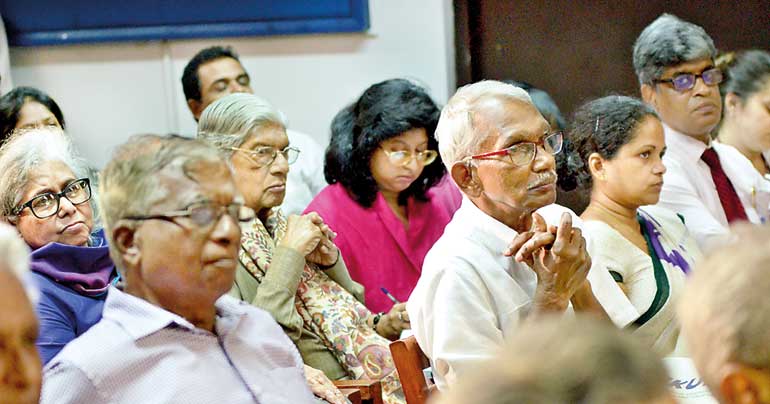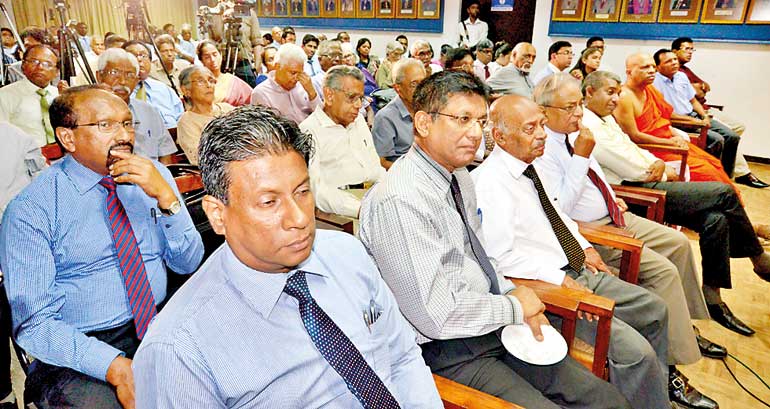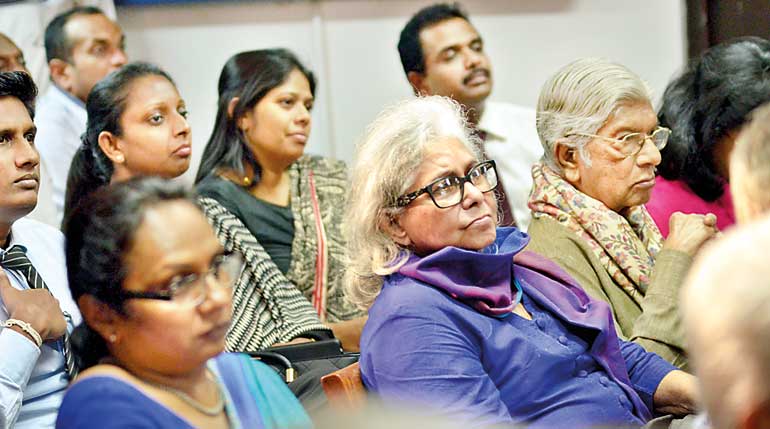Wednesday Mar 04, 2026
Wednesday Mar 04, 2026
Friday, 15 December 2017 09:25 - - {{hitsCtrl.values.hits}}
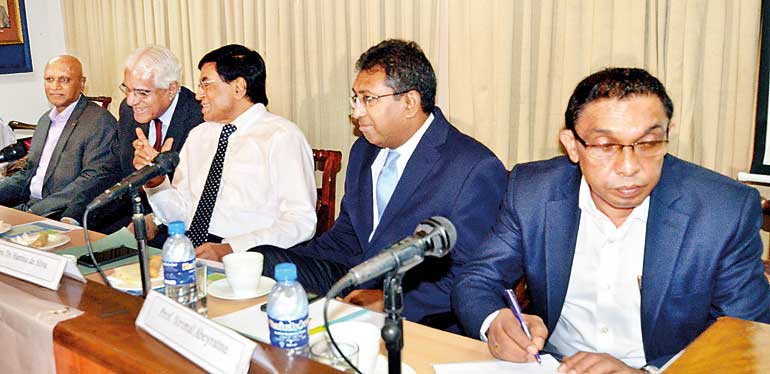
By Himal Kotelawala
A discussion on economic policy nearly turned sour Monday evening when ideologies collided at a Sri Lanka Economic Association (SLEA) organised seminar, with a visibly annoyed Deputy Minister Dr. Harsha De Silva suggesting that the organisers had deliberately allowed some speakers to turn the forum into a political platform.
He was ostensibly referring to a presentation made by Nature’s Secrets Chairman/Managing Director Samantha Kumarasinghe which had alleged that the Government had turned a deaf ear to domestic private sector concerns over the years while also allowing the Central Bank to be robbed.
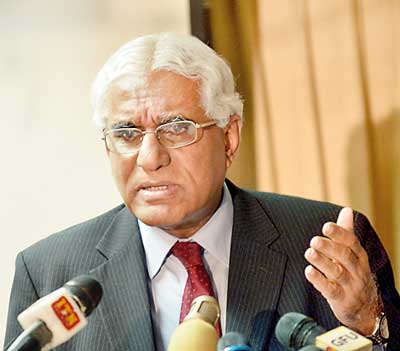 |
Central Bank Governor Dr Indrajit Coomaraswamy |
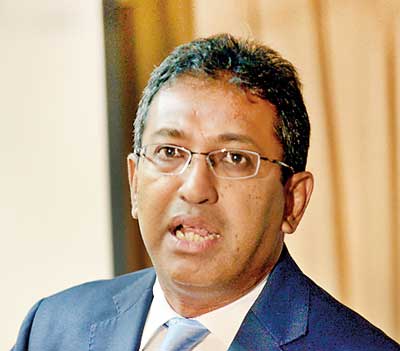 |
National Policies and Economic Affairs Deputy Minister Dr Harsha |
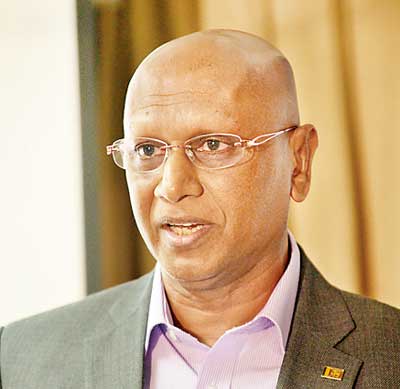 |
Nature's Secrets Chairman Samantha Kumarasinghe |
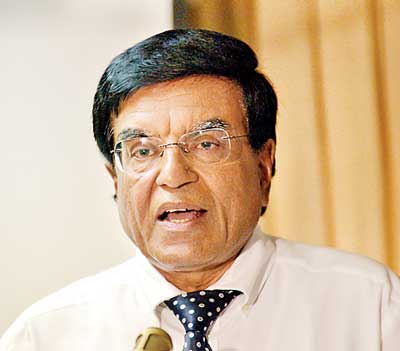 |
SLEA President Dr Upananda Vidanapathirana |
“We as industrialists should claim our loss from the Central Bank. [Commercial] banks also benefited from this. All the banks made huge profits after 2014, some more than 40%,” he said.
In his presentation, Kumarasinghe also criticised the Government’s decision to sign the Hambantota Port deal, making questionable assertions using debt-to-GDP ratios as evidence that the much talked about debt trap was being used as an excuse to sell off national assets.
“If we manage [the debt] properly we can still save our assets. We’re not in real trouble. But for some reason, we use these figures and say we’re in a debt trap and we go and sell our assets,” he charged.
In the Q&A session that followed Kumarasinghe’s presentation, things took a dramatic turn as Deputy Minister Dr. De Silva, who by then had already presented, used an opportunity that arose when an audience member asked a particularly hard hitting question to set the record straight.
The question, raised by one Rohan Wijeratne, pertaining to Government performance, prompted Dr. De Silva to curtly tell the audience member that he ought to be thankful that a white van would not be sent to his residence that night.
“You can trust me, Rohan, that I won’t send a white van to your house in the night. I won’t do that. People use this opportunity to make unsubstantiated, half baked, half truths, innuendos, accusations – which is not what I expected. If I came for a political debate here, I would’ve been able to do so. I came to present to you an intellectual position. And I expected the SLEA to ensure that such morals and ethics would be adhered to by those who you invite to make presentations,” said Dr. De Silva.
“You have the ability to get up and say what you want to say without batting an eyelid, because you can trust me there won’t be any repercussions,” he said.
The Deputy Minister, however, did agree that the Government could do more to deliver, echoing a statement previously made by Central Bank Governor Dr. Indrajit Coomaraswamy in his presentation that that there was an execution deficit on the part of the Government and a trust deficit in the private sector.
“But it takes time. I was elected in August 2015. It’s been less than 30 months. How much can you do in 30 months undoing what was done in 120 months?”
Dr. De Silva said that he remains committed to his pronouncements with regard to liberalisation and reform, and that it’s not his nature to do the opposite of what he says.
“I acknowledge that there is more to be done, I don’t dispute that. But don’t tell me we haven’t delivered on anything. We have,” he said, referring to points made in his own presentation at the start of the discussion.
“We’re in the process of ensuring that we have a better delivery mechanism in the next 24 months, that we’re able to deliver more within the existing system, the bureaucracy, the officialdom, etc.,” he went on to say, adding that under the previous regime, protestors and unions that went on strike would’ve been shot.
“In a democracy, there are things you can’t do at certain speeds. In an autocratic system you can do other things. There is a difference,” he said.
Kumarasinghe later, somewhat defensively, denied that he was being in any way political, asserting that he was simply sharing his views. SLEA President Dr. Upananda Vidanapathirane also hastened to distance the Association from any ensuing controversy by stating that it had never been a platform for political discourse.
Structural problems
In his presentation, Dr. De Silva highlighted various issues pertaining to the economy such as structural problems like persisting deficits on both domestic and external fronts, which he said had created a situation where the Government had to go into debt.
“In the process, revenue as a percentage of GDP has fallen because the monies that were borrowed were used for general deficit financing purposes. Even if it was used for capital expenditure, they were used for non-tradable activities,” said Dr. De Silva, adding that the nation as a whole has shifted from a tradable economy to basically a non-tradable economy.
The Deputy Minister said that the openness of Sri Lanka in 2014, before the Government took over, was the same as it had been in 1970, referring to total protection rates on one hand and private investment on the other.
Money was borrowed, he said, in US dollars to invest in various projects and the revenues were, if there were any, were in rupees. The debt payment was again in USD. At the same time, revenue from exports was falling. What was at 33% of GDP exports in 2001/2002 was 13% of GDP in 2015.
“You don’t have to be an economist to figure out the policy dilemma, the structural problem that this economy was in,” he said.
On the export side, he said, Sri Lanka had been on a continuing basis disengaging itself from trade.
“When a country like ours should’ve had a trade to GDP of way over 100% and going in an upward direction, we were going down.”
State-Owned Enterprises
The Deputy Minister also spoke of State-Owned Enterprises (SOEs), which he said were creating negative contributions to the GDP, as well as regulatory matters.
Touching on the oligarchical nature of the capital markets, Dr. De Silva said noted that State banks were “holding so much.”
In the last six to seven years, the Central Bank had used the EPF to purchase large chunks of private banks and appointed people connected to the State onto those boards, resulting in a situation where lending has been directed to some extent, and the independence of the private banking system has been captured by the state.
“The State has now become pretty much the largest shareholder of most of the commercial banks. The capital market outside has been weak, the bond markets haven’t been developed. There aren’t sufficient venture capital companies, no proper ecosystem for startups and so on,” he said.
Dr. De Silva stressed on the need to make Sri Lanka the centre of the Indian Ocean economy.
“It doesn’t matter who is in office. What matter is the idea that Sri Lanka has one proper strategy that if implemented we can come up as winners, and that is to integrate this nation with the rest of the world,” he said.
Pointing out that in the next 25 years, growth is going to come from Asia – this being Asia’s century – the Deputy Minister said that wealth is going to be created in the Bay of Bengal.
“To me we’re not a South Asian country. We don’t have much in common with Nepal or Bhutan or Afghanistan. To me, Sri Lanka is an Indian Ocean country, and I think that’s the kind of thinking that changes the paradigm of what we should be doing.
“The Government’s vision is to make sure that this nation becomes the centre of the Indian Ocean where growth is going to take place,” he said.
According to Dr. De Silva, the Government is singularly focused on trade, whether it comes to liberalisation of the shipping sector or the removal of para tariffs. Acknowledging that there will be some losers among a majority of winners, the Deputy Minister said that the Government is committed to ensuring that everybody is treated equitably.
“Where is the growth going to come from? Are we going to be a manufacturing nation, or a service profession nation? Our thinking is that we want to create a knowledge based, highly competitive social market economy at the centre of the Indian Ocean,” he reiterated.
No labour shortage or high cost of living
CBSL Governor Dr. Coomaraswamy calling for better labour laws said that there is no labour shortage in Sri Lanka, but rather a surplus in agricultural labour, trapping people in a low-productivity, low-income livelihood by providing the wrong incentives.
“We constantly hear the refrain that there is a labour shortage in this economy. In my view, there is no such shortage. The problem is we have labour in the wrong places. 27% of our workforce is in agriculture, giving us 7% of GDP. The Harvard Centre for International Development reckons that an economy at our level of development should not have more than 15% of the workforce in agriculture.
“There is this surplus labour in agriculture. And it is perfectly rational - at the moment, we’re trapping people in low-productivity, low-income livelihoods by giving people free water, fertiliser subsidies and a guaranteed price. People stay in agriculture, they’re able to get their noses above the water, but no pathway to go any further,” he said.
While Sri Lanka’s headcount poverty level is now down to about 4.4% based on little over a dollar a day, he said, if one were to increase that figure to about $2.50 a day, a third of the workforce would be below the poverty line.
“These are very difficult choices to make. It’s not going to happen overnight but there certainly isn’t a shortage of labour. We need to get investment into higher productivity, higher income areas,” he said.
Public sector workforce
The same is true in the public sector. According to Dr. Coomaraswamy, 17 to 18% of the workforce is in the public sector. (Notably, Greece had 15%). The number of people employed in the public sector in Sri Lanka has increased from 800,000 in 2006 to 1.5 million now.
“Leaving aside the intergenerational pension time bomb, clearly there is a surplus of labour in the public service. But again, people are behaving very rationally, because it’s only the 18% in the public service who have a pension, a non-contributory pension. So it’s clearly absolutely rational behaviour for everyone to want a job in the public sector,” he said.
If there were to be a pension for everyone, it needs to be a contributory pension, said the Governor, adding that the incentive structure in agriculture needs to be revisited.
“Do we want to keep trapping people there? Do we want a third of our people living on less than $2.50 a day? These are very tough political decisions. The labour is there, but it’s in the wrong place. And people are behaving very rationally by being in the wrong place. So we have to change incentive structure to move them into higher productivity, higher income areas.”
Labour laws and perverse outcomes
The country’s labour laws, according to Dr. Coomaraswamy, which go back many years, result in what he called perverse outcomes.
“While the limited number of people in the formal sector enjoy strong protection, what these laws do is reduce the overall labour standards in the economy,” he said.
Explaining this process, he said that the firms in the formal sector get around the labour laws by casualising employment. The all the big firms employ a significant number of people on a casual basis, where the labour laws don’t apply, reducing the overall standard of labour.
“What we need to do is to have a tripartite effort – I know it’s not easy in Sri Lanka, but really the Government, the unions and the private sector have to get together, as they have done in countries like Japan and Germany,” he said.
Dr. Coomaraswamy also questioned the refrain that cost of living is high in Sri Lanka.
“In my view, it’s not a high cost-of-living problem, but really a low productivity, low-income problem. People in Singapore don’t complain about the cost of living the way we do, because their incomes are a lot higher. They’re able to absorb international prices easier than we do. But as long as our productivity is low, income will be low,” he said.
However, there is another angle to this. Because Sri Lanka is almost unique in experiencing a demographic transitions before its economic transition, the country can no longer drive growth through labour augmentation.
“You can’t add workers to the labour force and drive growth. You have to drive it much more through productivity. We need a laser like productivity on productivity, that means focus on innovation and R&D, etc.,” he said.
Execution and trust deficits
The senior economist pointed to two key areas that need to be addressed in order to get things going.
“As far as the Government is concerned, there has been an execution deficit. This has to be addressed. Secondly, as far as the private sector is concerned, there is a trust deficit. Yes, there has been issues relating to the consistency of policies, but that is being addressed. Now it’s up to the private sector to recalibrate its risk appetite and to open their wallets and start to invest,” he said.
Because all Government development projects are going to take 18 months to two years to really gain traction, he said, next year, it’s the domestic private sector that has to take the lead.
“I think hopefully the conditions are being created for them to do that. These two deficits, I think, need to be addressed if we are to move forward,” he said.
Pix by Shehan Gunasekara
